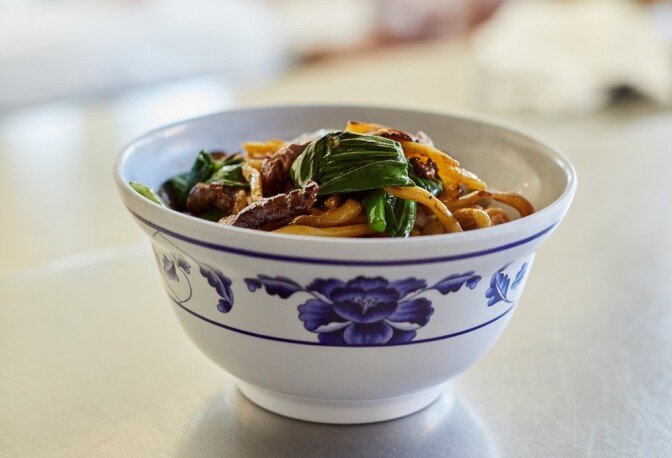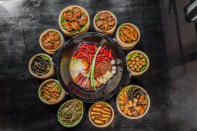[Editor's note: This story was first published in 2021 and is being updated and resurfaced again this holiday season because of that persistent question: Why are Chinese restaurants so popular at Christmas time?]
In 2019, the year Keegan Fong opened Woon, he decided he would close the Historic Filipinotown restaurant on Christmas Eve and Christmas Day. When he reopened on December 26, he was slammed for four straight days. Many of his Jewish customers asked, "Why weren't you open on Christmas?!"
That was when Fong realized how important the ritual of eating at a Chinese restaurant on Christmas was, and not just for Jews.
A short history
The tradition probably originated in Manhattan, where Jewish and Chinese immigrants clustered in neighborhoods near each other. Rabbi Joshua Plaut also theorizes in his book, A Kosher Christmas: 'Tis The Season To Be Jewish, that because neither culture celebrates the holiday, they're "'outsiders' on Christmas" so there's an inherent affinity there.
Plus, Chinese restaurants tend to stay open every day of the year, holidays be damned. Whatever initially drew diners to Chinese restaurants on Christmas, they've become a beloved destination for holiday feasts on both coasts, and everywhere in between.

The turnover is constant
Henry's Cuisine in Alhambra is one of those Chinese restaurants that seems like it never closes. (Until the COVID-19 pandemic hit, the restaurant had stayed open 365 days a year since debuting in 2014.)
The turnover can be constant. "On Christmas Eve and Christmas Day, one table can do four rounds [of seating]," says Henry Tu, one of the restaurant's founders.
He thinks that because Henry's Cuisine has a higher price point compared to other Chinese restaurants in the area, it actually does better around the holidays than on other days.
"On holidays, people don't care about spending $30 to $50 more," Tu says.

The Super Bowl of Chinese food
Genghis Cohen on Fairfax was opened in 1983 by Allan Rinde, a transplanted New York Jew who missed the kind of Chinese food he had grown up eating. The spot earned a loyal following among people who felt the same way. When Marc Rose and Med Abrous took over the joint in 2015, they knew to expect the holiday crowd.
"Christmas Eve and Christmas Day, we make the joke that it's our Super Bowl. It's extremely busy, and people rely on us to be there for them," Rose says. At Genghis Cohen, both dates are hopping for dine-in and takeout.
"People make reservations almost a year in advance. When they walk out of the restaurant on Christmas Day, they make a reservation for the next year," Abrous says.

Now, an "American way" of Christmas
Going out for Chinese food on Christmas may have started as a New York Jewish tradition but it has crossed cultures. The large portions and shareable dishes at Chinese restaurants are great for gatherings.
Genghis Cohen's No Name Duck and the whole lobster at Henry's Cuisine are favorites among holiday diners.
The owners of Hop Woo in Chinatown and Henry's Cuisine's say they see more non-Asian customers around Christmas than they do the rest of the year, but that doesn’t mean only white customers are showing up. They also serve a significant number of Chinese, Korean and Latino diners during this period.
"We see many of our long-time customers during this time," says Nick Chang, the Vice President of the Phoenix Food & Dessert chain, which has a number of full service restaurants and dessert shops, from Garden Grove to Rowland Heights. "Some of them have even made it a family tradition to dine with us on Christmas, which makes it more important that we stay open for the holidays."
"Over the course of a hundred years, now we don't feel like it's a specific cultural thing tied to Jewish people or New Yorkers for that matter," Rose of Genghis Cohen says. "We feel like it's become almost an American way of Christmas. If you're not with your family, not having a big gathering inside your house, you go out to eat. And Chinese American food, specifically, has become synonymous with that day and how people celebrate."
Still, don't assume a restaurant is open over the holiday season. Call before you head our, or, better yet, make a reservation. Woon, for example, will be closing its doors on Christmas Eve and Christmas Day.












